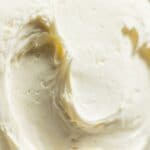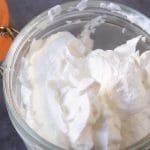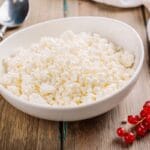In a nutshell, yes, you can freeze cottage cheese, but it will change the texture and flavor, so it’s best to use it for cooking or baking.
Also known as curds and whey, cottage cheese is a soft creamy cheese used in both savory and sweet applications. This mild, fresh cheese product is ideal for salads, sandwiches, desserts, baking, and cooked dishes.
Being able to freeze cottage cheese lets one make use of store specials to buy in bulk or have it handy for last-minute cooking. As with all dairy products, creamy cottage cheese denatures when exposed to varying temperatures, meaning that special precaution should be taken to ensure it stays safe to eat and preserve its taste as well as its texture.
Can Cottage Cheese Be Frozen?
Cottage cheese can be frozen; however, as with most dairy products, the texture of the cottage cheese will not be the same after thawing.
Similar to freezing cheese slices, the freezing process changes the temperature and therefore denatures the product and alters the flavor slightly, making it suitable only for use in baking or cooking.
Once thawed, cottage cheese is not pleasant to eat plain, or directly out of the container. Added into a cooked meal, you will likely not even notice the texture or flavor difference.
The amount of milk fat present in cottage cheese can play a significant role in how well it freezes, with full-fat cottage cheese being more suitable for freezing than its reduced-fat, or fat-free counterparts.
How To Freeze Cottage Cheese
Cottage cheese can be frozen in its original unopened container. However, you will then have to defrost the entire batch when needed. It is advisable to additionally place the container in a sealed freezer bag or double wrap it in cling film.
Freezing cottage cheese for maximum quality preservation if you have already opened the container. Here’s how:
Step 1: Quality Check
Check that the cottage cheese is fresh and has not started to spoil. If the cottage cheese is already starting to spoil, it is not suitable for freezing, nor safe to consume and should be discarded.
Step 2: Portion and Package
Divide the cottage cheese into your desired portion sizes, considering what you may use it for and how much you would need at a time. Place each portion in a resealable (airtight) freezer bag.
Step 3: Remove Air
Freezer bags are preferable over containers as they pose a lower risk of freezer burn.
Lie the bag flat and remove all the air before sealing, as this prevents the formation of ice crystals.
Step 4: Double Wrap
Cottage cheese easily absorbs other food aromas and flavors. To avoid this and to safeguard against freezer burn, wrap each freezer bag in clingfilm or place the bags in an airtight container with a secure lid.
Step 5: Label
This is optional but will allow you to keep track of how long the cottage cheese has been in the freezer and allow you to use the oldest batch first. Label and date your packaged items with a permanent marker before placing them in the freezer.
How Long Does Cottage Cheese Last in the Refrigerator?
This type of cheese is a fresh dairy product meaning it can be sensitive to bacterial growth and food contamination. Always store cottage cheese in the refrigerator. If unopened and sealed, it will last in the fridge for as long as two weeks.
Once the tub has been opened, and the seal is broken, it should be consumed within 5 to 7 days.
How Long Does Frozen Cottage Cheese Last in the Freezer?
Placing cottage cheese in the freezer is an excellent way to preserve it. Cottage cheese lasts up to six months in the freezer if properly packaged, sealed, and kept in an airtight container. It is best to use fresh cheese for the best quality and avoid the risk of freezer burn within three months of freezing.
How To Thaw Frozen Cottage Cheese
To prevent bacterial growth, it is best not to leave frozen cottage cheese to defrost at room temperature as this may compromise food safety. Follow the instructions below to ensure you defrost cottage cheese safely.
Step 1: Place in Fridge
Place the freezer bag containing the cheese in a bowl inside the fridge. Leave it in the fridge overnight to thaw.
Step 2: Drain Liquid
Once defrosted, drain the excess liquid from the curds.
Step 3: Add Sour Cream
If you find the cottage cheese consistency too dry for your liking, add one tablespoon of sour cream per cup of cottage cheese and mix well to reconstitute its creamy consistency.
Types of Cottage Cheese
Besides cottage cheese being available in large curd, small curd, chunky, or smooth varieties, this soft cheese is mainly categorized into three groups based on the amount of milk fat present in the product.
#1. Full Cream Cottage Cheese
Regular, full cream cottage cheese is rich and creamy, containing a minimum of 4 percent milk fat.
#2. Low-Fat Cottage Cheese
Low fat or reduced-fat cottage cheese comes in a variety containing anything between 0.5 and 2 percent milk fat.
#3. Fat-Free Cottage Cheese
Fat-free cottage cheese is also known as dry curd and contains less than 0.5 percent milk fat. Due to the low-fat content, this variety of cottage cheese is not recommended for freezing.
FAQs
Conclusion
While freezing does not change the nutritional value of cottage cheese, it does alter the texture and taste. With full cream varieties being the best option for freezing, this creamy dairy product can still be preserved in the freezer for long term use if added to cooked or baked goods on defrosting. After you thaw cottage cheese, it won’t be appetizing to eat as is.
Whether your cottage cheese is fresh from the store, or has been frozen and thawed, ensure that it is not left out at room temperature and always use clean utensils to handle it.
Whether you are making pancakes, pie, muffins, or a delicious creamy lasagne, cottage cheese is a superb creamy yet healthy recipe addition.
See more:
- Can You Freeze Cream Cheese?
- Can you freeze and thaw yogurt?
- Can feta cheese be frozen?
- Can you freeze fresh mozzarella?
Image by depositphotos/AndreySt









